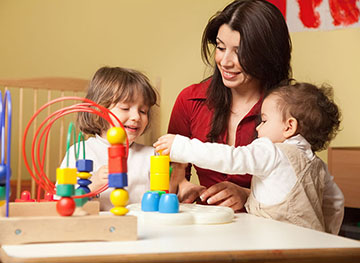About half of American infants and toddlers receive regular care outside the home, creating a pressing need to promote stable, nurturing relationships between children and caregivers. A newly published research brief aims to help policymakers and practitioners understand effective relationship-based practices that could improve care in Early Head Start and other centers serving infants and toddlers.
“There is a growing consensus that relationship-based care practices are optimal for infants and toddlers, but most child care centers are not set up to provide or to support such practices,” said Cheri Vogel, a senior researcher at Mathematica Policy Research who was part of the research team. “Our comprehensive review found evidence that illustrates the importance of relationship-based care in children’s healthy development and future educational achievement, and addresses ways in which child care centers might overcome some of the hurdles to establishing better practices.”

The brief features:
- Insights into two key practices: primary caregiving (assigning one teacher the primary responsibility for the care of a small group of children within a larger group setting) and continuity of care (keeping a child with the same teacher and group of children for an extended period of time).
- Examples of early childhood organizations and programs that support relationship-based care practices.
- Considerations for implementing relationship-based practices in early childhood care centers and recommendations for dealing with challenges related to center staffing, organization, space and facilities, and financial impacts.
- A review of federal and state policies related to adopting relationship-based caregiving practices, along with tools for policymakers to use in considering how to promote such practices.
Members of the Network of Infant/Toddler Researchers and the Quality Initiatives Research and Evaluation Consortium conducted the review for the Office of Planning, Research, and Evaluation (OPRE) of the Administration for Children and Families.
The new brief extends Mathematica’s work in building the evidence base on early childhood programs and policies, which includes the six-year Baby FACES descriptive study of Early Head Start conducted for OPRE. Recent publications from the Baby FACES project include a report that sheds light on the development of 3-year-olds and an assessment of the quality of Early Head Start home visits and classrooms.
